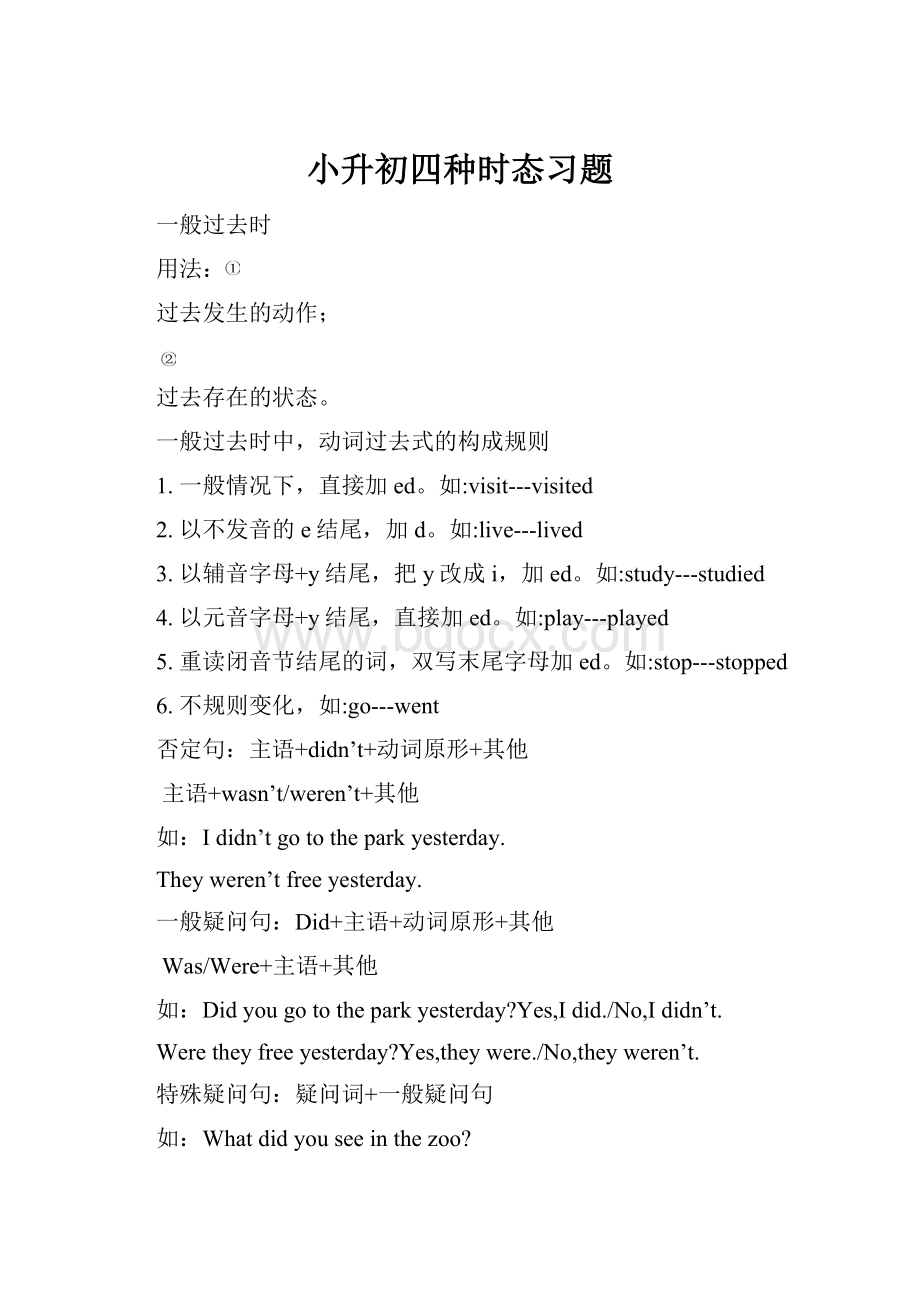小升初四种时态习题.docx
《小升初四种时态习题.docx》由会员分享,可在线阅读,更多相关《小升初四种时态习题.docx(15页珍藏版)》请在冰豆网上搜索。

小升初四种时态习题
一般过去时
用法:
过去发生的动作;
过去存在的状态。
一般过去时中,动词过去式的构成规则
1.一般情况下,直接加ed。
如:
visit---visited
2.以不发音的e结尾,加d。
如:
live---lived
3.以辅音字母+y结尾,把y改成i,加ed。
如:
study---studied
4.以元音字母+y结尾,直接加ed。
如:
play---played
5.重读闭音节结尾的词,双写末尾字母加ed。
如:
stop---stopped
6.不规则变化,如:
go---went
否定句:
主语+didn’t+动词原形+其他
主语+wasn’t/weren’t+其他
如:
Ididn’tgototheparkyesterday.
Theyweren’tfreeyesterday.
一般疑问句:
Did+主语+动词原形+其他
Was/Were+主语+其他
如:
Didyougototheparkyesterday?
Yes,Idid./No,Ididn’t.
Weretheyfreeyesterday?
Yes,theywere./No,theyweren’t.
特殊疑问句:
疑问词+一般疑问句
如:
Whatdidyouseeinthezoo?
Whowereathomelastnight?
常用时间状语:
yesterday,threemonthsago,lastweek/year,in1990
例句:
Healwayswenttoworkbybuslastyear.
HanMeimeiwasintheclassroomamomentago.
Whendidyoumeethim?
轻松试一下
一.写出下列不规则动词的过去式。
am,iskeeparelet
becomemakebeginmeet
biteputblowread
buycostcatchrun
comesayridesee
cutsingdigsit
dosleepdrawspeak
drinksweepeattake
fallteachfeedtell
feelthinkflythrow
forgetunderstandgetgive
wakegowearknow
winhave/haswritegrow
二.用动词的适当形式填空。
1.It(be)mybirthdaylastFriday.
2.--- Mike(play)computergamesyesterday?
---No,he.He(go)toseeafilm.
3.Jenny(tell)menottocometoonearthesnakelasttime.
4.Jenny(milk)acowlastFriday.
5.LastSaturdaymymother(go)shoppingand(buy)measkirt.
6.Shelikesnewspapers,butsheabookyesterday.(read)
7.Mymother(plant)atreelastyear.
8.they(sweep)thefloorlastFriday?
No,they.
9.I(notwatch)acartoonyesterday.
10.We(not)gotoschoolyesterday.We(go)tothepark.
11.Jack’sfather(give)himapresentforhisbirthday.
12.they(visit)themuseumlastSunday.
13.---Who(teach)youEnglishlastyear?
---MrChen(do).
14.We(draw)manypicturesyesterday.
15.Hefootballnow,buthebaskteballanhourago.(play)
16.---Whenyourbrother(get)here?
---He(get)here5daysago.
17.Weall(have)agoodtimeyesterday.
18.---Whenyou(begin)tolearnEnglish?
---I(begin)tolearnEnglish5yearsago.
19.you(have)adogbefore?
20.Myfather(notstay)athomeyesterday.He(go)toGuangzhou.
21.He(run)fastestonlastSportsDay.
22.(be)youtall3yearsago?
23.I(benot)athomeanhourago,I(be)atschool.
24.---Whenyou(take)thesephotos?
---I(take)themlastmonth.
25.Who(feed)thedogyesterday?
三.选词填空。
LastyearI1someappleseedsinapot.I2themeveryday.Theshoots3soon
Theyoungtrees4verywell.ThenI5theyoungappletreesinmygardeninfrontofmyhouse.Yesterdaythestrongwind6.Someofmyappletrees7broken.
ThismorningI8tosavethebrokentrees.ihopethetreeswillgrowbetter.
1.A.amputtingB.willputC.put
2.A.waterB.wateredC.watering
3.A.appearB.appearsC.appeared
4.A.growB.growedC.grew
5.A.plantedB.plantingC.plant
6.A.blowB.blewC.isblowing
7.A.areB.wasC.were
8.A.tryB.triedC.tries
一般现在时
用法:
现阶段经常性、习惯性动作,常与表示频度的时间状语连用。
时间状语:
often,always,sometimes,usually,never,everyday,everyyear,onSundays,twiceayear
如:
Ileavehomeforschoolat7everymorning.
目前的状态;
如:
Guangzhouis2313kilometresawayfromBeijing.
客观真理;
如:
Theearthmovesaroundthesun.
ShanghailiesintheeastofChina.
在时间状语从句或条件状语从句中,一般现在时代替一般将来时。
(主将从现)
如:
I'llhelpyouassoonasyouhaveproblem
构成:
主语是第三人称单数时,作谓语的行为动词要加词尾-s(-es),其他人称和数用动词原形。
一般现在时中第三人称单数作主语时,谓语动词的变化规则:
1.一般情况下,直接加s。
如:
get---gets
2.以o、sh、ch结尾的动词,加es。
如:
do---does
3.辅音字母加y结尾,改y为i,加es。
如:
study---studies
4.元音字母加y结尾,直接加s。
如:
enjoy---enjoys
否定句:
I/you/we/they/he/she+donot+动词原形===Idon’t/youdon’t/wedon’t/theydon’t+动词原形
he/she/it+doesnot+动词原形===hedoesn’t/shedoesn’t/itdoesn’t+动词原形
如:
Hedoesn’tpractiseEnglisheverymorning.
Idon’tenjoyplayingbadmintoninwinter.
疑问句中:
须将助动词Do/Does提前到句首,其余不变
例:
DoyouworkasaccountantinLondon?
Doesshegotothecinemaonweekends?
轻松练一下
一.写出下列动词在第三人称单数时的正确形式。
dogowashcatch
swimhavemakewish
studyplaymovewrite
二.用动词所给的适当形式填空。
1.Mymother(work)inaprimaryschool.
2.Herparents(notwork)inGuangzhou.
3.There(be)somemilkinthebottle.
4.SheandI(take)awalktogethereverymorning.
5.Myaunt(look)afterherbabycarefully.
6.He(be)strong.Hecan(carry)theheavybox.
7.Nancy(go)toschoolonfooteveryday.
8.We(notwatch)TVonweekdays.
9.yourparents(read)newspaperseveryday?
10.---Who(study)hardestinyourclass?
11.Ourteacher(be)alwaysbusy.
12.I(have)atoyplaneandBen(have)atoybike.
13.Whathe(do)everyevening?
14.I(be)anathlete.
15.Heoften(have)dinneratschool.
16.DanielandTommy(be)inClassOne.
17.Kateoften(play)chesswithherfriends.
18.Nick(notgo)tothezooonSundays.
19.they(like)hamburgers?
20.Mysister(be)apupil.She(study)veryhard.
21.Mymotheroften(go)shoppingand(buy)somevegetablesinthemarket.
22.Ben(like)cooking.
23.Ialways(finish)myhomeworkbefore8:
00.
24.They(have)abighouse.
25.Mymotherisateacher.He(teach)Englishinamiddleschool.
26.Lucy(do)notlikeEnglish.
27.Who(cook)breakfastforyoueveryday?
三.按要求转换句子,每空一词。
1.Tomlikesplayingchesswithhisfriends.(改为否定句)
Tomplayingchesswithhisfriends.
2.Janet’sparentsoftengoforawalkintheevening.(改为一般疑问句并作出否定回答)
Janet’sparentsoftenawalkaftersupper?
-No,.
3.HeusuallywatchesTV.(改成一般疑问句)
heusually?
4.Shehassomeredshirtsandgreenscarves.(变成否定句)
Sheanyredshiktsandgreenscarves.
现在进行时中,现在分词构成规则:
1.一般情况下,直接加ing。
如:
go---going
2.以不发音的e结尾,去e加ing。
如:
live---living
3.swim、stop、run、sit、put、cut等双写末尾字母加ing。
如:
stop---stopping
轻松试一下
一.写出下列动词的现在分词形式。
goenjoyteacheat
drawwalktakeget
dancewriterunswim
二.用动词的适当形式填空。
1.Listen!
Who(talk)withyourmother.
2.Look!
Acat(climb)upthetree.
3.Lucyis(clean)thebedroomnow,
4.---you(clean)yourbedroom?
---No,I’mnot.I’mcleaningthelivingroom.
5.---Kate(read)?
---No,sheisn’t.She(eat)lunchnow.
6.Look!
Theboy(swim)withhisfriendsinthepool.
7.She(write)aletternow.
8.Thereadingroomisquiet.Everybody(read)booksandmagazines.
9.Keepquiet.Father(sleep)inthenextroom.
10.Theboy(draw)apicturenow.
11.Whatyou(do)now?
12.Listen!
Somechildren(sing)intheclassroom.
13.Mymother(cook)now.
14.Look!
They(have)anEnglishlesson.
15.They(notwater)theflowersnow.
16.Look!
Thegirls(dance)intheclassroom.
17.WhatisJanedoing?
She(listen)tomusic.
18.Lily(wash)clothes?
Yes,sheis.
19.Liumei(notdraw),She(sing)now.
20.It’steno’clockandBenstillhishomework.
三.按要求改写句子。
1.TheyarehavinganEnglishclass.(改成一般疑问句)
2.Mymotheriscooking.(变成一般疑问句并且作肯定回答)
3.HeiswatchingTV.(改成否定句)
4.Jeanisreadingastorybook.(就划线部分提问)
一般将来时
用法:
将来发生的动作;
将来存在的状态。
一般将来时构成
助动词will(shall)+动词原形
be(am/is/are)+goingto+动词原形
例句:
Theywill(aregoingto)meetoutsidetheschoolgatetomorrowafternoon.
Ifhecomesback,I’lltellhimaboutit.(主将从现:
在时间状语从句和条件状语从句中用一般现在时来代替将来时)
Iwillbe16yearsoldnextweek.
否定句:
在will后加not(缩写为won’t):
Shewon’tgotoplaybasketball.
一般疑问句:
将will直接提到句首:
Willshegotoplaybasketball?
回答:
Yes,shewill./No,shewon’t.
特殊疑问句:
疑问词+一般疑问句:
Whowillgotoplaybasketball?
常用时间状语:
tomorrow,nextweek,in2012,intwohours,soon,thisevening,thedayaftertomorrow
轻松练一下
一.根据中文意思,补充句子,每空填一词。
1.我打算明天和朋友去看电影。
Iwatchafilmwithmyfriendstomorrow.
Iwatchafilmwithmyfriendstomorrow.
2.你明天打算干什么呢?
我想去踢足球。
---Whattomorrow?
---Iplayfootball.或者:
---Whatyoudotomorrow?
---Iplayfootball.
3.明天将要比今天冷。
Tomorrowcolderthantoday.
4.你们打算什么时候回广州?
WhenyoucomebacktoGuangzhou?
二.用动词的正确形式填空。
1.Lily(sing)anEnglishsongforuslater.
2.I(be)25yearsold10yearslater.
3.Mymother(cook)somedeliciousfoodtomorrow.
4.Summerholidayiscoming.Whatyou(do)?
5.Mybagisbroken.I(buy)anewonethisSaturday.
6.I(write)aletterthisevening.
7.They(have)apicnicintheparkthisweekend.
8.We(visit)thehistorymuseumnextweek.
9.He(make)akitethisSaturday.
10.Myuncle(fly)toShanghaitomorrow.
11.you(borrow)booksfromthelibrarytomorrow?
三.用英语表达下列句子。
1.我打算明天去拜访我的爷爷奶奶。
2.我的爸爸和我今天晚上将要看一场足球比赛。
3.小红将要去买一支钢笔。
4.你会来我的生日聚会吗?
过关检测(家庭作业)
一.选择题
1.Sheusuallyherfriends.Theyoftentea.
A.visit;drinkB.visits;drinksC.visits;drink
2.Theybasketballthismorning.
A.isplayingB.playedC.playing
3.XiaoLingmanypicturesyesterday.
A.takesB.tookC.taked
4.Benoftenpicturesathome.Heacarnow.
A.draws;isdrawingB.draw;drawC.draws;draw
5.Mrs.Webbseafoodverymuch.
A.likeB.likesC.islike
6.hetotheparkat6:
30inthemorning?
No,he.
A.Does;goes;doesB.Does;go;doesn’tC.Does;go;does
7.Whatcolouryouthispicture?
Iitpink.
A.are;goingtopaint;amgoingtopaint
B.do;paint;paint
C.did;paint;painted
8.Yesterdaywasmybirthday.Mydadapresentforme.
A.boughtB.buysC.buyed
9.Mygrandfatherusuallynewspaperafterdinner.
A.readB.readsC.readingD.isreading
10.TheBlacksoftentothecinemaonSaturdayevenings.
A.goB.goesC.isgoingD.aregoing
11.Theoldmanusuallyupatsixandsportsinthegarden.
A.gets;dosB.gets;doesC.get;doesD.gets;do
12.---WhatisTomdoingintheclassroom?
He.
A,drawsB.drawC.isdrawingD.aredrawing
13.Heusuallythedishesatnight,butnothingheclothes.
A.wash;washB.washes;isgoingtowashC.iswashing;washes
14.Look!
Twocatsarossthewall.
A.runB.runsC.arerunning
15.Myuncleadoctortwoyearsago.
A.willbeB.isC.was
16.Whatyouusuallyintheevening?
A.do;doB.do;doesC.does;did
17.Mr.Greenusuallyhisnewpaperintheevening,butheandhiswifetelevisionyesterdayevening.
A.reads;watchesB.reads;isgoingtowatchC.reads;watched
18.Wherearethemanandthewoman?
They